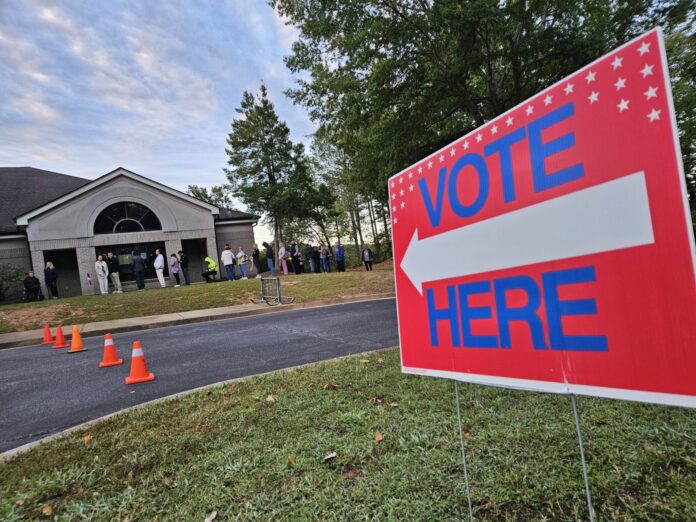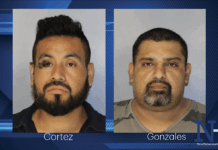
(Georgia Recorder) — A three-judge federal court panel spent an hour in a downtown Atlanta courthouse Tuesday hearing arguments from attorneys about whether a conservative Texas organization’s mass voting challenges during a 2021 runoff violated the federal Voting Rights Act by intimidating minority voters.
Plaintiff Fair Fight Action, founded by Stacey Abrams, argued in the U.S. Court of Appeals for the Eleventh Circuit that U.S. District Court Judge Steve C. Jones erred in ruling last year that True the Vote’s challenge to 365,000 Georgia voters’ eligibility did not constitute intimidation prior to historic Democratic Senate victories in Georgia when Raphael Warnock and Jon Ossoff prevailed in the Jan. 5, 2021 runoff.
At least one of the judges expressed skepticism about the soundness of the lower court ruling.
Mass voter challenges have been a mainstay in Georgia since the 2020 presidential election, when Democrat Joe Biden narrowly defeated Republican Donald Trump by about 12,000 votes in the state.
According to Fair Fight Action and others who filed suit, True the Vote’s actions likely violated the Voting Rights Act by using inaccurate voter registration information and voter intimidation tactics such as posting citizen watchdogs to monitor people casting ballots.
On Tuesday, the federal panel peppered the attorneys with questions while acknowledging the case’s national significance on voting rights protections.
Attorney Jake Evans, representing True the Vote, asserted that the intent behind the mass challenges was to protect election integrity.
Evans said that the mass challenging of voters’ eligibility prior to the 2021 runoff did not amount to voter intimidation.
Fair Fight’s attorney, Uzoma Nkwonta of the Elias Law Group, argued that although Jones acknowledged recklessness in his ruling, the district court erred in not following the generally accepted standard for taking a substantial step towards the course of action that led to the injury.
Nkwonta referenced the Muscogee County election board having to take up more than 4,000 challenged ballots from the 2020 November general election based on faulty national change of address data.
“Not only was it foreseeable, it’s exactly what True the Vote wished for and exactly what True the Vote demanded,” Nkwonta said. “True the Vote issued press releases, prepared one-pagers, considered suing counties and did everything in their power to force (Muscogee) County to take the very action that they took.”
“The voter intimidation statutes have been enforced since the 1960s and even earlier, and they often involve cases in which individuals were applying laws or taking actions that were permissible in every other scenario, but were impermissible because they were intimidating voters,” Nkwonta said.
Evans said that over the course of a seven-day trial the voters who testified did not provide proof of how they were intimidated by True the Vote. He argued the plaintiffs have failed to prove a violation of the Voting Rights Act.
“An attempted act has to be traceable to the alleged intimidation,” Evans said. “Here, there are three individual voters where there is no connection. There is no alleged challenger that’s submitted to challenge these individuals. It’s completely untraceable.”
Judge Federico Moreno said he disagreed with Evans stating it was an “open and shut appeal.”
“I don’t know about the substantive 11 B claims, but I think the district court committed legal error with regard to the attempt,” Moreno said, referencing a section of the act that bars voter intimidation. “Attempt is generally defined, both in civil and criminal law, as the intent to carry out an objective and taking a substantial means toward doing that.”
Moreno provided an anecdote about how a bank robber told a teller, “Give me the money in your drawer” before then being thwarted by a security officer.
“That person has attempted to commit bank robbery, even though he has not stolen the money because he was stopped by a third-party intermediary,” Moreno said.
In addition, Moreno questioned Evans about whether an organization that filed several hundred frivolous voter challenges could be considered an attempt to intimidate voters.
Evans said that True the Vote did not use tactics to intimidate voters like other cases where robocalls were used to threaten voters or Native Americans were targeted by sending people to follow them into polling places.
“Judge Jones looked at the evidence,” Evans said. “He evaluated the demeanor of the witnesses. He saw the witnesses testify, evaluated the totality of the evidence, and he made a factual finding in his order that said that there was no intent by True the Vote to intimidate any voter, any witness.”






